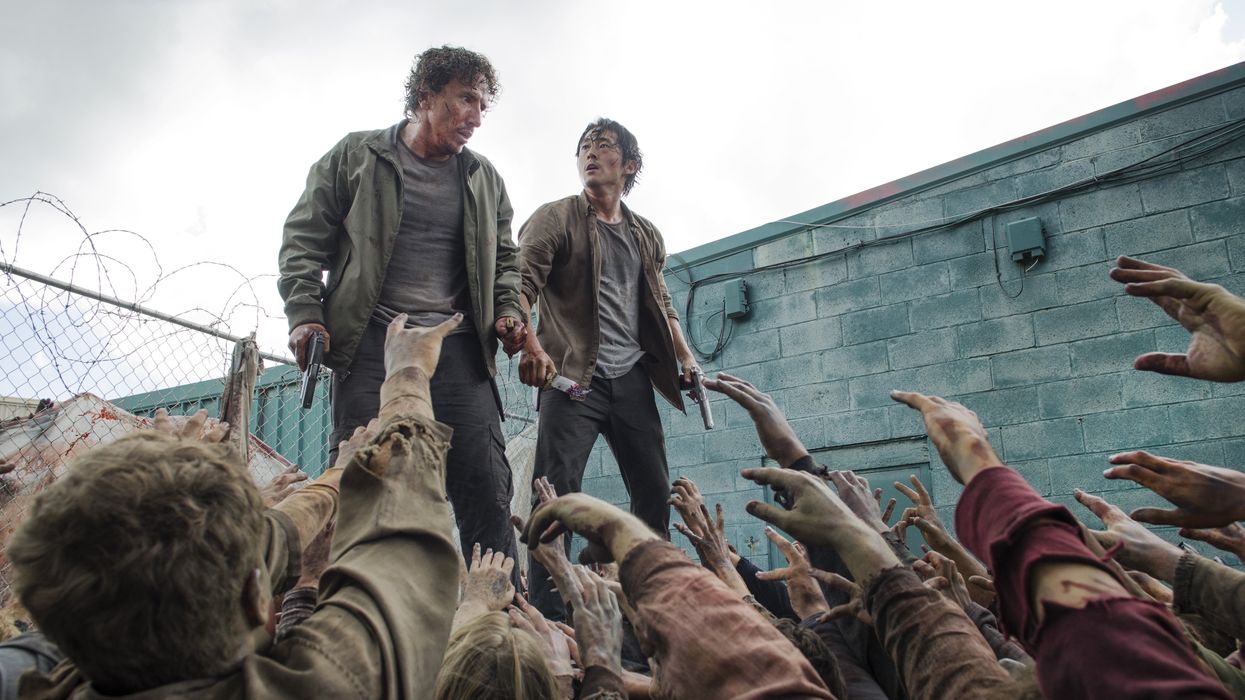TV is the New Black: Top Editors on Cutting in TV's Cinematic Age
What's it like to be a television editor? Experts explain.

There has perhaps never been a better time to be an editor in Hollywood, though according to panelists who spoke on a panel at the Sight, Sound & Story event in New York, the job is different than it used to be.
The three editors— Kabir Akhtar, ACE (Crazy Ex-Girlfriend, Arrested Development, New Girl), Suzy Elmiger, ACE (Mozart in the Jungle, Master of None, Casual), and Julius Ramsay, ACE (The Walking Dead, Battlestar Galactica)—spoke with moderator Michael Berenbaum, ACE in a panel entitled "TV is the New Black: Television's Cinematic Revolution." The wide-ranging conversation covered everything from how to break into the industry to the difference between features and TV. It also answered a pertinent question: Just what, exactly, does "cinematic" mean in the Golden Age of TV?
How to Break In: "There are No Rules"
In response to a query about how the panelists had ended up in the world of narrative TV (as well as any advice they'd have for young editors), each told their own story about how they had found their way into the editing suite and what they were looking for in new talent. All three of the panelists stressed the importance of relationships to breaking into the industry—as well moving up, once you have your foot in the door.
For Ramsay, who, along with Akhtar, started his career working in reality TV (the two met while working on the erstwhile ESPN show Behind the Glory), persistence was one of the keys to success in television editing. A three-time Emmy nominated editor for his work on The Contender, Battlestar Galactica, and The Walking Dead, Ramsay insisted that "there are no rules."
Some of the best money an aspiring editor can spend is on a subscription to IMDB Pro.
"There's no reason you can't pick up the phone and call someone and be persistent," Ramsay said. "If I get one email, I almost always ignore it. If they bug me twice or text me, I'll probably have lunch with them." He related how one editor, who was at the time cutting trailers, got in touch with him via the show's music supervisor. Owing to the editor's persistence, enthusiasm, and knowledge, he is currently down in Georgia directing his first episode of the same series.

According to Ramsay, some of the best money an aspiring editor can spend is on a subscription to IMDB Pro, where it's possible to get almost everyone in the industry's contacts. He also stressed that while it was important to reach out to whoever you thought could be helpful, it was wise to "wait a week" between emails when approaching potential connections.
For Suzy Elmiger, the path to the editing suite was slightly different. Elmiger started in the film era, learning her trade cleaning film and rewinding reels in the documentary unit at CBS. She also made Super 8 films, and gradually, after working as a script supervisor ("it was a disaster," she recalled), realized her passion lay in editing.
Like Ramsay, Elmiger stressed the importance of reaching out to industry contacts as well as studying different kinds of editing. "You have to home in on what it is that you want to go after," she said. "That's good homework to do." Elmiger herself connected to Alan Heim's cutting in the film All That Jazz. Years later, she tracked him down and ended up working with him.
"If I get one email, I almost always ignore it. If they bug me twice, or text me, I'll probably have lunch with them."
Akhtar stressed how much he had learned cutting for reality TV, even though it was a genre he had no particular interest in and hoped to move over to narrative. He also said that it was particularly important to "know people who are doing the kinds of stuff you want to do." If you want to do narrative comedy, make connections with people who are doing narrative comedy, because "whatever your first job is, you can spend your whole life doing that."

Features vs. TV
Why are so many editors working in TV rather than feature films?
Akhtar, a three-time Emmy Award nominee, said, "There's a difference between 90 minutes and a 60- to 80-hour universe...we build immersive stories. As a fan, I want to stay there. It's a bummer when a 90-minute movie ends."
Elmiger, who has a great deal of experience in the differences between TV and film, said that while it could be a five-year process to make a feature, the prevailing attitude was different for TV. "Make an episode here and there and keep on doing it," she said. "The process is much more buoyant. Features get in bogs. You'll have a lousy screening, people freak out. On TV, you move on."
Inevitably, the conversation turned to the term "cinematic" and what it means with regard to contemporary TV. Elmiger responded that while TV used to be primarily a close-up medium, producers are increasingly looking for "cinematic" looks, which, to her, meant "making [the place] slower" and "letting the whole thing play out in a master shot."
In Ramsay's experience, what producers were asking for when they dropped "cinematic" was a certain tone.
"Tone is the most important thing to understand," she said, "when cutting cinematic television."
Source: Sight, Sound & Story













